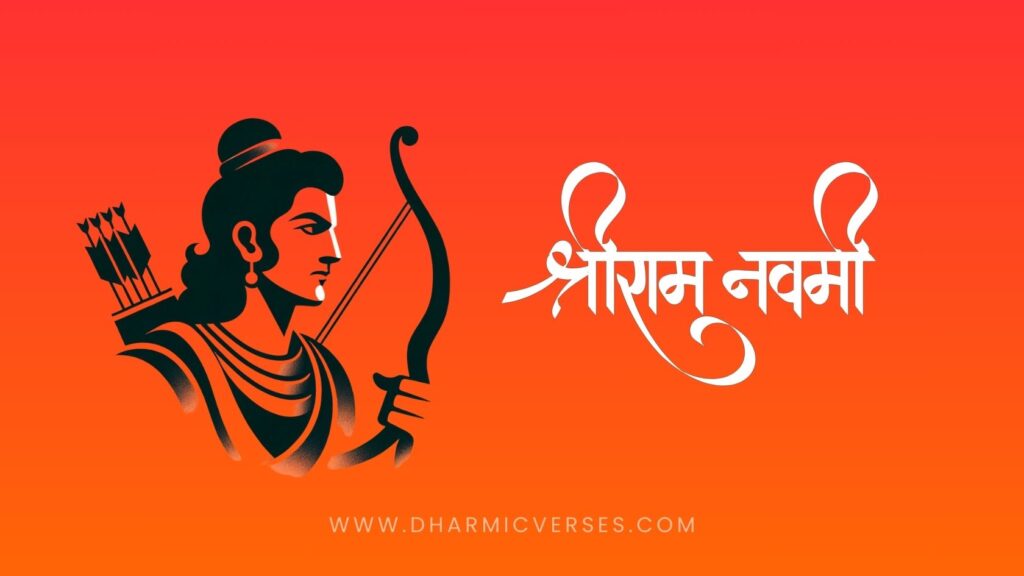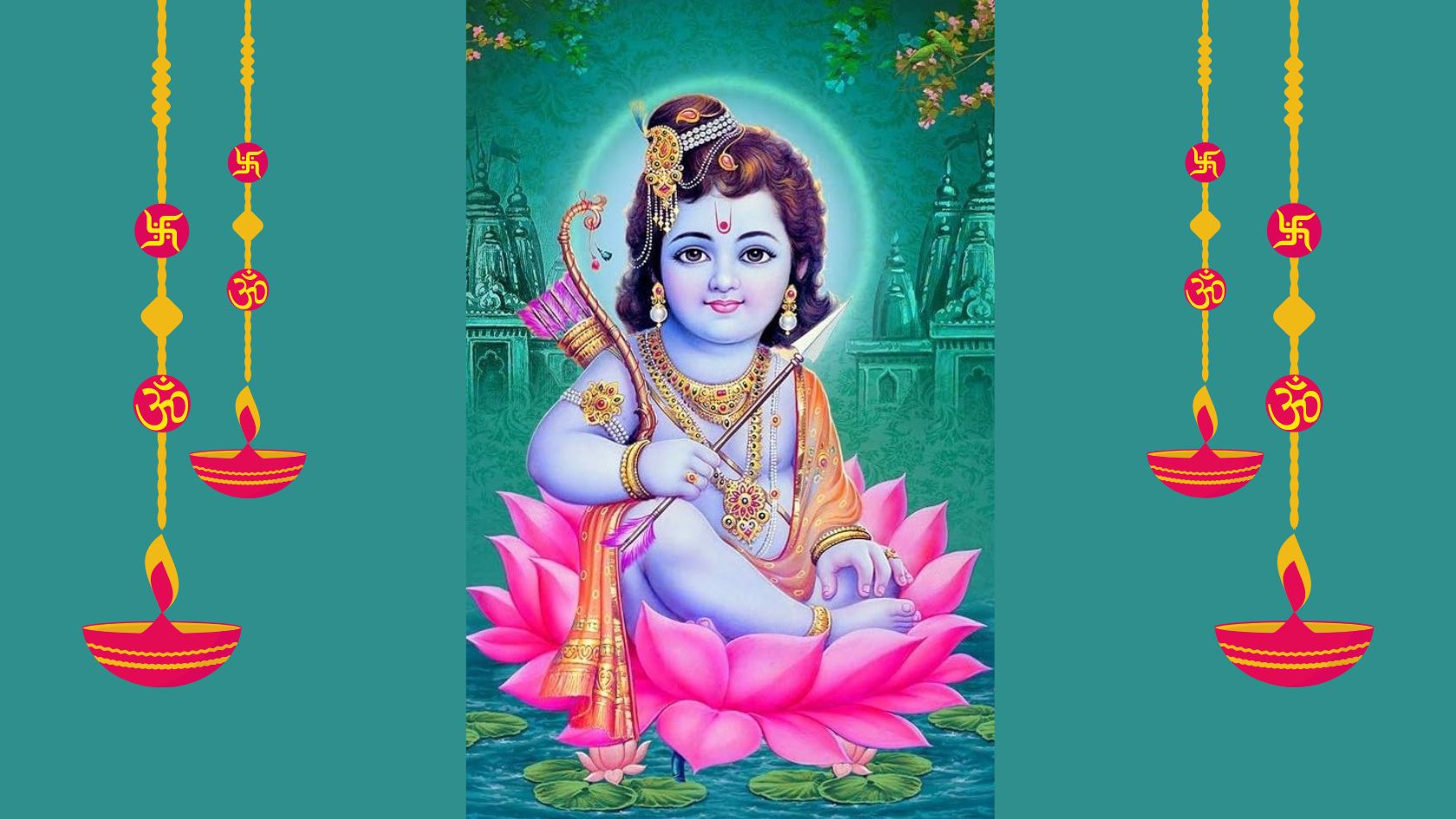Celebrating Ram Navami: The Auspicious Birth of Lord Rama
Ram Navami marks one of the most sacred days in the Hindu calendar. It celebrates the divine birth of Maryada Purushottam Shri Ram, the seventh avatar of Bhagwan Vishnu. Lord Rama’s life exemplifies dharma, idealism and moral values.
The Ramayana epic extols his virtues and narrates his heroic journey – from his divine birth in Ayodhya to his epic battle against the demon king Ravana in Lanka.
On Ram Navami, devotees across India and around the world celebrate Rama’s birth, remembering his noble life and imbibing his lofty ideals. As we observe Ram Navami, let us reflect upon the noble life and timeless teachings of Bhagwan Shri Ram.
The Divine Advent
The story of Rama’s birth is a wondrous one. King Dasharatha of Ayodhya performed the Putrakameshti Yagna under sage Rishyasringa to beget worthy heirs. A divine being emerged from the sacrificial fire, bearing a golden bowl of celestial porridge. Dasharatha gave the porridge to his three queens, who soon conceived.
To Queen Kaushalya was born Rama, the divine incarnation of Vishnu’s Chaturvyuha – endowed with all noble virtues. His birth at noon in the Punarvasu Nakshatra is most auspicious, as the Skanda Purana states:
“Ajanishta Ramo Ramabhadro Dasharathaha |
Punarvasau Madhyandine Kaale Prashastayoh ||”(Rama, the auspicious one, was born to Dasharatha at midday in the Punarvasu asterism.)
Rama’s birth marks the advent of dharma and righteousness in the world. As the Valmiki Ramayana declares:
“Raamo Vigrahavaan Dharmaha Saadhuh Satyaparaakramaha |
Raajaa Sarvasya Lokasya Devanaaam Iva Vashavaha ||”(Rama, the embodiment of righteousness, the virtuous one, the one of truthful valor, is the king of all the worlds just as Indra is of the gods.)
Ideal Son, Ideal King

From an early age, Rama displayed the qualities of an ideal son and prince. Obedient, virtuous and skillful, he was loved by all. The Ayodhya Kanda describes his training and accomplishments:
“Vedaan Adhiitya Paryaaptam Naanaashaastraani Cha Prabhuh |
Paramatmaani Dharmaatmaa Sarvayuddhavisharadaha ||”(Having thoroughly mastered the Vedas and various scriptures, the Lord, the righteous soul, became adept in all forms of warfare.)
But it is in his unflinching adherence to dharma that Rama’s greatness truly shines. When exiled to the forest for 14 years on the eve of his coronation, Rama calmly accepted his fate. Discarding his royal robes for hermit’s attire, he left for the forest with Sita and Lakshmana, honoring his father’s word.
As king, Rama ruled wisely and well, embodying the ideal of a ‘Rajarshi’ – a sage among kings. He placed the welfare of his subjects above all else. The Uttara Kanda says:
“Raamam Daashtrathim Vidvan Sarvaloka Hitaisinaam |
Sarvalakshana Sampannam Raajaanam Samupasthitam ||”(They beheld Rama, son of Dasharatha, endowed with all noble attributes, desirous of the welfare of all, installed as the king.)
Vanquisher of Evil
Rama’s greatest feat was the slaying of Ravana, the ten-headed demon king of Lanka who had abducted Sita. This epic battle of good vs evil is the heart of the Ramayana.
With his loyal vanara army, Rama built a bridge across the ocean to Lanka. Fierce battles ensued, with heavy losses on both sides. Finally, Rama engaged Ravana in direct combat. Chanting the Brahmasthra mantra, he sent forth his mighty arrow.
Ravana fell dead, his evil reign ended forever by the Lord’s hand. Good had triumphed over evil, dharma over adharma. Sita was freed and reunited with her beloved Rama.
The Yuddha Kanda describes the jubilation of the gods at Ravana’s downfall:
“Hatho Raavana Ityetat Amaraa Vipulaamgiraa |
Ramam Samstuvatoh Hrishtaaha Sadhuvaakyena Chaagrataha || ”(With immense delight, the gods loudly exclaimed “Ravana has been killed!” and joyfully extolled Rama with cries of “Excellent! Well done!”)
The Ramayana teaches us that the true battlefield lies within. To conquer the “Ravana” within ourselves, we must cultivate virtues like self-control, compassion, and humility. As the Mundaka Upanishad (3.1.1) states:
सत्यमेव जयते नानृतं सत्येन पन्था विततो देवयानः ।
येनाक्रमन्त्यृषयो ह्याप्तकामा यत्र तत् सत्यस्य परमं निधानम् ॥“Truth alone triumphs, not falsehood. Through truth the divine path is spread out, by which the sages, whose desires have been fulfilled, reach the place where that supreme treasure of Truth resides.”
Traditions and Celebrations
Ram Navami is a day of great festivity and devotional fervor. Devotees observe a day-long fast, breaking it only after sunset. Many temples across India re-enact the divine marriage of Rama and Sita.
The holy city of Ayodhya, Rama’s birthplace, sees grand celebrations lasting several days. Thousands gather to chant Rama’s name and partake in the festivities. The famous Kanak Bhavan mandir in Ayodhya resonates with kirtans and bhajans praising Lord Rama.
In south India, the festival is celebrated as the marriage anniversary of Rama and Sita. Kalyanam (marriage) ceremonies are held in temples with much fanfare. Panakam, a sweet jaggery and pepper drink, is served as prasadam.
Reading the Ramayana and chanting Rama’s name are considered highly meritorious on this day. Special pujas and yagnas are performed. The popular Ram Raksha Stotra is recited for protection and blessings:
“Raamaaya Raamabaadraaya Raamachandraaya Vedhase |
Raghunaathaaya Naathaaya Seetaayaah Pataye Namah ||”(Salutations to Rama, the auspicious one, the moon-like one, the knower of Vedas, the Lord of Raghus, the Lord of Sita!)
Key teachings from the life of Lord Rama that remain relevant in the modern world
- Upholding dharma above self-interest: Throughout his life, Rama demonstrated that one must adhere to dharma and moral values, even at the cost of personal loss. His unwavering commitment to truth exemplifies sacrificing self-interest for the greater good.
- Importance of family values: Rama’s devotion to his parents Dasharatha and Kaushalya shows the significance of honoring one’s elders and parents. His loving bond with brothers Lakshmana, Bharata and Shatrughna highlights ideal family relationships.
- Compassion and righteous conduct: Rama treated all beings with empathy and respect, from his allies to foes like Ravana. Despite Ravana’s cruelty, Rama gave him a warrior’s death, showing compassion befitting his stature. This exemplifies virtuous conduct even towards adversaries.
- Equality and justice: As king, Rama was committed to ensuring social equality and justice for all his subjects. His rule treated the rich and poor as equals, emphasizing dharma and ethical governance.
- Courage and resilience: Facing injustice, loss of his kingdom, exile and war, Rama endured many trials but did not abandon the path of truth and dharma. His composure and resilience provide lessons on maintaining perseverance amidst adversity.
- Mindfulness and self-control: Rama demonstrated restraint and detachment, managing his senses, mind and emotions skillfully. His measured response to provocation and ability to stay centered show the importance of mindfulness and self-mastery.
- Leadership with wisdom: Rama was not just a great warrior but also a wise leader who considered the counsel of allies before major decisions. His leadership balanced strength with wisdom, providing a model for judicious statecraft.
In essence, Lord Rama’s life serves as a living guidebook, illuminating pathways towards dharmic living that remains applicable even in the modern age. His conduct and values can steer individuals, families and even nations towards righteous action.
Jai Shri Ram!
As we celebrate another joyous Ram Navami, let us remember and imbibe the timeless teachings of Lord Rama. May his life and message continue to guide and inspire us through life’s journey.
In the words of Goswami Tulsidas:
“Raghupati Raghav Raja Ram, Patit Pavan Sita Ram
Sita Ram Sita Ram, Bhaj Pyare Tu Sita Ram!”(Raghupati, the Lord of Raghus, Purifier of the fallen, Sita-Rama
Sita-Rama, Sita-Rama, Beloved, sing the names of Sita-Rama!)
Jai Shri Ram! May the divine light of Lord Rama illumine our hearts and homes this Ram Navami and always.


Comments are closed.